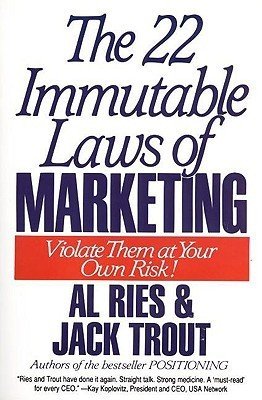“There are laws of nature (physics), so why shouldn’t there be laws of marketing?”
I’m not sure if that’s a rhetorical question, but the problem with anything “immutable” is the timeliness of the examples used to justify it. This book has not held up well because the supporting evidence were dated or turned out to be contrary to the point the authors intended to illustrate. For example, Toys R Us has since gone bankrupt, so it’s not just department stores that suffered under the “law of category”.
While a number of laws make sense, several contained multiple fallacies of false equivalence. If you try to apply different “laws” to the same example, you may end up with a contradictory narrative.
Here’s a summary of the 22 “immutable” laws. See for yourself how these can be applied to a variety of situations, like how you get your fortune told.
#1 The Law of Leadership: It’s better to be first than it is to be better.
#2 The Law of Category: If you can’t be first in a category, setup a new category you can be first in.
#3 The Law of the Mind: It’s better to be first in the mind than to be first in the market place
#4 The Law of Perception: Marketing is not a battle of products; it’s a battle of perceptions.
#5 The Law of Focus: The most powerful concept in marketing is owning a word in the prospect’s mind.
#6 The Law of Exclusivity: Two companies cannot own the same word in the prospect’s mind.
#7 The Law of Ladder: The strategy to use dependent on which rung you occupy on the ladder.
#8 The Law of Duality: In the long run, every market becomes a two-horse race.
#9 The Law of the Opposite: If you’re shooting for second place, your strategy is determined by the leader.
#10 The Law of Division: Over time, a category will divide and become two or more categories.
#11 The Law of Perspective: Marketing effects take place over an extended period of time.
#12 The Law of Line Extension: There’s an irresistible pressure to extend the equity of the brand.
#13 The Law of Sacrifice: You have to give up something in order to get something.
#14 The Law of Attributes: For every attribute, there is an opposite, effective attribute.
#15 The Law of Candor: When you admit a negative, the prospect will give you a positive.
#16 The Law of Singularity: In each situation, only one move will produce substantial results.
#17 The Law of Unpredictability: Unless you write your competitors’ plans, you can’t predict the future.
#18 The Law of Success: Success often leads to arrogance, and arrogance to failure.
#19 The Law of Failure: Failure is to be expected and accepted.
#20 The Law of Hype: The situation is often the opposite of the way it appears in the press.
#21 The Law of Acceleration: Successful programs are not built on fads, they’re built on trends.
#22 The Law of Resources: Without adequate funding an idea won’t get off the ground.

